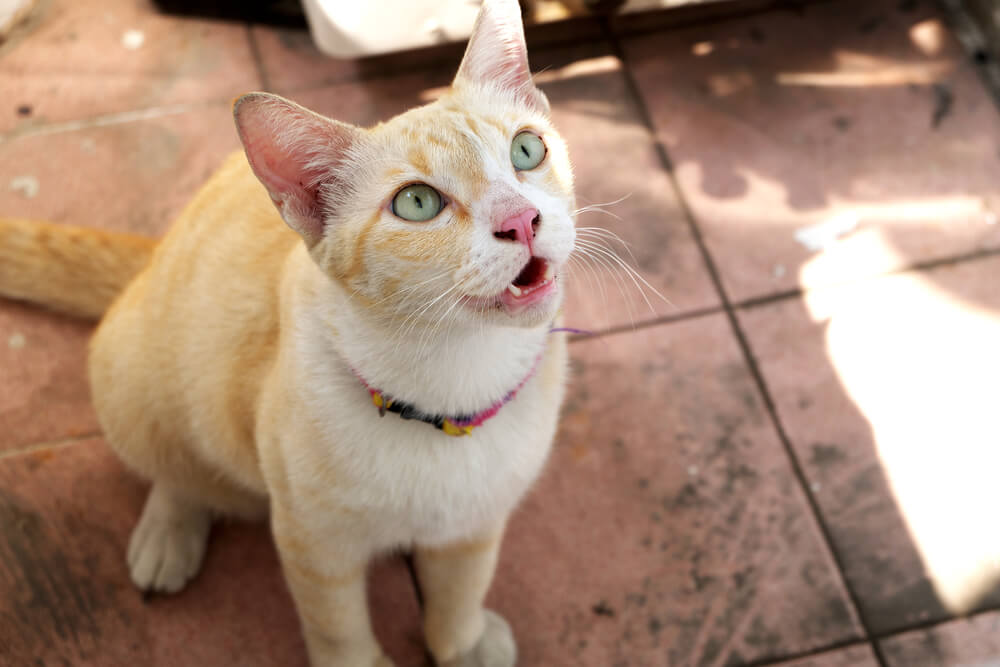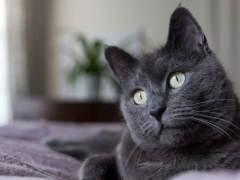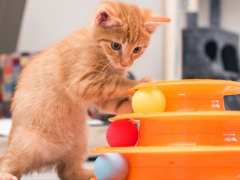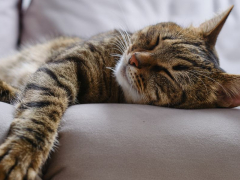
A cat’s meow usually doesn’t change much in its sound. This high-pitched note starts low, goes up in pitch, and generally lasts less than a second to a few seconds long.
A hoarse meow loses the normal pure tone and comes out raspy and rough. With this, sometimes the cat loses their voice altogether, acquiring a silent meow. Their purr may also be affected.
Why does this happen? In this article, we’ll go over why a cat may develop a hoarse meow, when to see a vet, and how you can help your cat at home.
The cat’s larynx is in the center of their throat, just like our own. When the larynx becomes inflamed, its delicate, flexible structure becomes thicker, less elastic, with a buildup of discharges around the vocal folds. These changes mean that the voice box is no longer able to produce the same, high pitched sounds as normal.
Does your cat’s meow sound strange? Are you saying to yourself “why is my cat not meowing normally?” Are you wondering if such voice changes are indicative of a serious problem? In this article, we’ll go over the causes of this problem, and suggest what you might do to help.
What Are the Causes of a Cat Hoarse Meow?
Most cats with a hoarse meow have a form of cat laryngitis. This condition is defined by an inflamed larynx, the delicate structure that houses the vocal cords that generate the sound of a meow.
Mild, self-limiting laryngitis (like a sore throat in humans) is the most common cause of a hoarse meow. There are different common reasons why temporary laryngitis can develop.
- Viral upper respiratory infections: This includes feline calicivirus (FCV), feline rhinotracheitis or herpes virus (FVR) and others.
- Direct irritation to the airway: Inhaling dust or smoke may cause hoarseness.
- Trauma: An example is a direct injury to the throat during a cat fight.
- Excessive meowing: A cat who’s especially vocal may wear their voice out.
Aside from laryngitis, there are other, more serious causes for a hoarse meow:
- Nasopharyngeal polyps: these can alter the sound of vocalizations
- Space occupying masses around the larynx: these include abscesses and tumors
- Foreign bodies: anything which shouldn’t be in the larynx, such as inhaled blades of grass
- Laryngeal paralysis: this is where the muscles of the larynx no longer move normally. This is common in middle aged dogs, but rare in cats.
- Hyperthyroidism: this can lead to an altered voice in a cat
When to Call the Vet?

If a hoarse meowing is the only issue troubling your cat, it’s probably nothing serious and there’s probably no need to ask for the vet’s advice immediately.
As long as the cat is well in every other way—eating, drinking, behaving normally—there is not normally any need to rush to the vet. Often, just like in humans with mild laryngitis, the full normal voice will return within a couple of days, or perhaps a week or two.
If the change carries on beyond a few days, or if the animal shows other signs of a health problem, then a visit to your veterinarian becomes necessary. Further symptoms may include sneezing, discharge from eyes or nose, difficulty in eating or swallowing, a fever or lack of appetite.
Treatment of a Hoarse Voice in a Cat
As long as your cat remains bright and generally well, eating properly and behaving normally, it’s often safe to wait for a while, and your cat’s normal voice may resume within a week or two.
However, if your pet shows any other signs of illness, or if their voice has not returned after a few weeks, a visit to your vet is needed. Your DVM veterinarian will take a detailed history, perform a physical examination of your cat and may discuss further tests, such as routine blood tests and diagnostic imaging.
It’s important to follow your vet’s advice when it comes to treating a hoarse meow in cats. Treatment will depend on the cause of the hoarse voice.
Infectious and inflammatory causes may need treatments such as antibiotic or anti-inflammatory medications. Foreign bodies (such as blades of grass), need to be physically removed, and growths, such as polyps, need to be properly assessed then surgically excised. Space occupying masses, such as tumors or abscesses, need full and detailed treatment, depending on their precise details.
There may be some steps you can take to help your cat at home – although always check with your veterinarian.
- Use steam treatment or set up a humidifier.
- Feed soft foods to encourage appetite.
- Ensure sufficient fresh water is always available.
You will know yourself when your cat has made a full recovery, because their voice will return to normal. For more serious causes of a hoarse voice, your vet will advise you on what rechecks are needed.In most cases, cats make a full recovery, with their normal voice returning within a few weeks, but this does depend on the precise cause.
Prevention of a Hoarse Meow
Some causes of a change in your cat’s meow cannot be prevented, but there are some risk factors, such as some infectious diseases, which we can influence. Cat owners should follow veterinary advice on preventative care such as vaccinations, and take measures to keep outdoor cats safe to reduce injuries, fights, and trauma.
Frequently Asked Questions
How do you treat a raspy voice in cats?
Treatment depends on the cause of the change in the voice, and ranges from masterly inactivity (simply waiting for the issue to resolve naturally) through to surgical intervention and other treatments for more serious causes.
Is it bad if my cat's meow is raspy?
A raspy voice is an indication of some sort of disease of the voice box (larynx) so this should never be ignored.
Can a cat's voice get hoarse?
Just as humans can get a hoarse voice for a range of reasons, so can cats. This can be a meow that sounds different, a change in the sound of the purr, or sometimes it can mean that they lose their voice completely for a while, meowing silently and not purring at all.








My cat went missing for approximately a month. Then miraculously appeared outside our door. He was extremely thin and paws were dirty. I have a funny feeling he was stuck somewhere and either finally escaped or was let go. He must’ve meowed a lot because the poor boy sounds like a bullfrog or duck. He has been home just over a week and has gained weight and I am still mixing in extra water with wet food to boost hydration. I don’t know what else I can do to help his throat.
There really isn’t much else you can do other than to wait for “the tincture of time” to do its work. Hopefully, by resting his voice over the coming weeks, his normal miaow will return.
My 14 year old Calico cat has a raspy meow. She doesn’t have any other symptoms, just the raspiness. What can I give her for her throat? Because when my voice gets raspy its from the mucus in the back of my throat. She stares at me when it starts bothering me. I quit smoking 6 years ago and can breathe a whole lot better except for this issue. I know my throat gets sore from the coughing that’s why I’m asking
Hi Catherine, this is such a sweet and caring question. Do you know if your cat’s voice has always sounded like this? Some cats simply have raspy meows, and it doesn’t mean there’s anything wrong or uncomfortable. If this is new, it could point to overuse of the voice. In any case, there’s not much you can do to treat it, other than making sure you’re closely monitoring your cat for any other symptoms or signs of issues. Wishing you and your kitty all the best!